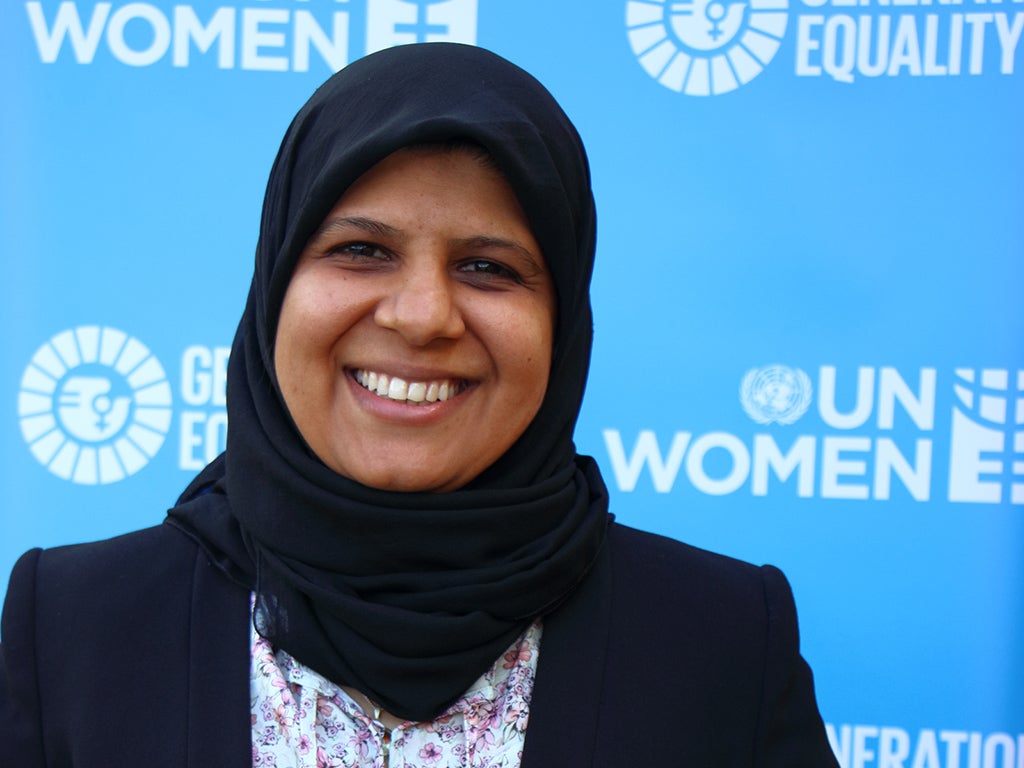Expert’s Take: Gender Inequalities Reducing Agricultural Productivity
Date:

Prior to the war in Ukraine, women in sub-Saharan Africa were already less likely to have coping strategies to respond to shocks. The crisis is putting pressure on women in rural East and Southern Africa as it increases the strain on critical supply chains in the agricultural sector and food supplies in sub-Saharan Africa. Mehjabeen Alarakhia, UN Women Regional Policy Specialist on Women’s Economic Empowerment discusses key challenges and solutions. (Photo: UN Women/James Ochweri)
In sub-Saharan Africa, women are at the centre of economic production as they constitute almost half of the agricultural labour force and, therefore, excluding them means cutting the labour force in half. Lower rates of agricultural productivity for female cultivators relative to male has been observed in East and Southern Africa.
A series of studies conducted by UN Women and UNDP-UNEP-Poverty Environment Action in East and Southern African countries entitled ‘The Cost Of The Gender Gap In Agricultural Productivity’ found that some countries in the region are losing over USD 100 million in GDP per year due to gender inequality in the agricultural sector. Notably, the biggest driver of the gender gap is women’s unpaid care and domestic work responsibilities and the gendered expectation that women will work as unpaid family farm workers. The findings showed further constraints faced by women, including limited access to male family labour, lack of cash income resulting in limited use of agricultural machinery, pesticides or fertilizers, lower tendency to plant high-value cash crops due to women’s responsibilities to provide food for the households, and disadvantageous access to credit and quality farmland.
The Ukraine crisis puts further pressure on women in rural East and Southern Africa as it increases the strain on critical agriculture and food supply chains in sub-Saharan Africa. Globally, Russia is the main exporter of wheat, while Ukraine accounts for 40 percent of the world’s sunflower oil exports. Women in rural communities are highly dependent on both of these commodities. The rise in fuel prices, also caused by the war in Ukraine, is being felt directly in several countries in the region – for example, Tanzania has seen an increase of over 20 per cent in fuel prices at the pump. This has resulted in an increase in the cost of transportation of goods, including agricultural goods, but has also had a cascading impact on the costs of other items. The increasing prices of these commodities raise concerns about food security for rural African households.
In the long term, given that Russia is the world’s biggest fertilizer producer, the agricultural sector stakeholders could see a reduced supply of fertilizer and subsequent scarcity or increased prices. ‘The Cost of the Gender Gap in Agricultural Productivity’ studies have shown that men tend to use fertilizers more than women, which contributes to their increased agricultural productivity. With a potential scarcity, men’s productivity may also decrease, exacerbating the financial constraints on the household.
With the already weakened economic position of African countries following the COVID-19 pandemic, where full recovery has not yet been achieved, the knock-on impacts of the Ukraine crisis are expected to negatively impact the cost of food in-country and undermine women’s ability to meet their household food security needs.
Women’s contribution in agriculture not only promotes food security and nutrition but contributes to overall economic growth. It is evident that empowering women in agriculture and reducing gender disparities is a development booster. The progress made to date in increasing the agricultural productivity of women needs to be protected and further invested in.
UN Women conducted a gender assessment of the fiscal response packages in Uganda, Kenya, and Mozambique during the COVID-19 pandemic. The assessments found that rural African women have generally been left out of fiscal response packages. Drawing from these learnings, African governments could design strategies that support rural women as key agricultural producers and bridge the strain on critical supply chains in commodity markets, investigate and provide subsidies for agricultural inputs such as fertilizers and pesticides to boost agricultural production, and further subsidize fuel prices for vulnerable groups.